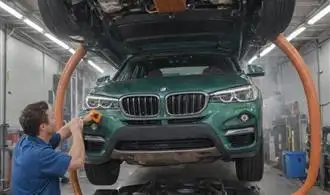
Neglecting Regular Oil Changes
Regular oil changes are the lifeblood of your BMW X3's engine. Skipping or delaying this essential maintenance task can lead to a cascade of issues that can ultimately cost you significantly in the long run. Understanding the importance of timely oil changes and the consequences of neglecting them is crucial for BMW X3 owners who want to preserve the longevity and performance of their vehicle.
Engine Wear and Tear: The oil in your BMW X3 serves as a critical lubricant, reducing friction and wear on engine components. Over time, the oil breaks down and becomes less effective at its job. Driving with degraded oil can cause increased friction, leading to accelerated wear on vital engine parts, such as pistons, bearings, and cylinders. This wear and tear can result in decreased engine efficiency, decreased fuel economy, and, in severe cases, complete engine failure.
Increased Oil Consumption: As engine components wear down due to neglected oil changes, your BMW X3 may begin to consume oil at a faster rate. This increased oil consumption can lead to low oil levels, which in turn can exacerbate engine wear and tear, creating a vicious cycle of declining performance and rising maintenance costs.
Sludge Buildup: Outdated oil can also lead to the formation of sludge, a thick, gooey substance that can accumulate in your BMW X3's engine. Sludge buildup can clog vital oil passages, restricting oil flow and preventing proper lubrication of engine components. This can result in increased friction, reduced engine efficiency, and, in extreme cases, catastrophic engine failure.
Decreased Fuel Efficiency: As your BMW X3's engine becomes less efficient due to neglected oil changes, you may notice a decrease in fuel economy. This not only costs you more money at the pump but also increases your carbon footprint, making your vehicle less environmentally friendly.
Voided Warranty: Many automakers, including BMW, require regular maintenance, including oil changes, to be documented in order to maintain the validity of your vehicle's warranty. Neglecting this critical task could potentially void your warranty, leaving you responsible for costly repairs that would otherwise be covered.
Importance of Brake Maintenance
The BMW X3 is a popular luxury SUV renowned for its performance, handling, and reliability. However, to maintain these exceptional qualities, the vehicle's brake system requires regular attention and care. Ignoring brake maintenance can lead to costly consequences that no BMW X3 owner wants to face.
Brakes are the primary safety feature of any vehicle, and their proper functioning is crucial for the driver's and passengers' wellbeing. In the BMW X3, the brake system is engineered to provide precise, responsive, and consistent braking, but this can only be maintained through diligent maintenance. Neglecting brake care can result in a range of issues, including decreased braking efficiency, increased stopping distances, and even the risk of complete brake failure.
Brake pads and rotors are the heart of the brake system, and they are subjected to significant wear and tear with regular use. Over time, these components can become thin, uneven, or warped, compromising their ability to effectively grip the wheels and slow the vehicle. Maintaining a regular schedule for brake pad and rotor replacement, as recommended by the manufacturer, is essential to ensure the BMW X3's brakes remain in peak condition.
In addition to the brake pads and rotors, the brake fluid plays a vital role in the system's performance. Brake fluid absorbs moisture over time, which can lead to a decrease in its boiling point and a reduction in braking effectiveness. Flushing the brake fluid at the recommended intervals, as specified in the owner's manual, helps to maintain the integrity of the brake system and prevent potentially dangerous situations.
Brake calipers, which clamp the brake pads against the rotors, are another critical component that requires attention. Stuck or seized calipers can cause uneven wear on the brake pads and rotors, leading to decreased braking performance and the need for premature replacements. Regularly inspecting the calipers and ensuring their smooth operation is essential for maintaining the BMW X3's braking capabilities.
Consequences of Ignoring Tire Rotations
Tire rotations are a crucial aspect of maintaining the BMW X3, yet many owners overlook this essential service. Ignoring this routine task can lead to a host of problems that could end up costing you significantly in the long run. One of the primary consequences of neglecting tire rotations is uneven tire wear. Each tire on your BMW X3 experiences a unique set of forces and stresses due to the vehicle's weight distribution and driving dynamics. By regularly rotating the tires, you ensure that the wear is evenly distributed, extending the life of your tires and helping you get the most value from your investment.
Neglecting tire rotations can also impact the handling and performance of your BMW X3. When tires wear unevenly, it can create an imbalance in traction and grip, making the vehicle more difficult to control, especially in emergency situations or on slippery surfaces. This can compromise your safety and the safety of your passengers. Additionally, uneven tire wear can lead to increased vibrations, which not only diminish the overall driving experience but can also contribute to premature wear on other suspension and steering components.
Another significant consequence of ignoring tire rotations is the potential for decreased fuel efficiency. Tires that are wearing unevenly require more energy to overcome the resistance, resulting in higher fuel consumption. This not only impacts your wallet at the pump but also contributes to a larger carbon footprint, which is an important consideration for many BMW X3 owners who value environmental responsibility.
Ignoring Suspension Maintenance
As a BMW X3 owner, the health of your vehicle's suspension system is crucial. The suspension is responsible for providing a smooth and comfortable ride, ensuring optimal handling, and maintaining the integrity of your car's structure. Neglecting suspension maintenance can lead to a host of problems that can cost you dearly, both in terms of safety and financial implications.
One of the primary components of the BMW X3's suspension system is the shocks and struts. These critical components absorb the impact of bumps and uneven road surfaces, preventing the transfer of excessive force to the chassis. Over time, the shocks and struts can wear down, causing them to lose their ability to effectively dampen the ride. This can result in a bouncy, unstable driving experience, making your X3 more prone to handling issues and potentially even making it unsafe to operate.
Another crucial aspect of suspension maintenance is the regular inspection and replacement of the ball joints and bushings. These components play a vital role in ensuring the smooth and precise movement of the suspension components. When they become worn, they can cause a range of problems, including increased tire wear, steering wheel vibration, and even a loss of control over the vehicle.
Ignoring the maintenance of your BMW X3's suspension can also lead to accelerated wear on other related components, such as the tie rods, control arms, and wheel bearings. As these parts become compromised, the overall stability and handling of your vehicle will deteriorate, increasing the risk of accidents and costly repairs.
Furthermore, neglecting suspension maintenance can have a significant impact on the overall longevity of your BMW X3. The suspension system is designed to work in harmony with the rest of the vehicle's components, and when one part is allowed to deteriorate, it can put additional strain on the entire system, leading to more extensive and expensive repairs down the line.
Neglecting Coolant System Upkeep
The BMW X3's coolant system is a critical component that requires diligent maintenance. Ignoring its upkeep can lead to costly consequences, jeopardizing the vehicle's performance and longevity. One of the primary functions of the coolant system is to regulate the engine's temperature, preventing overheating and ensuring optimal operating conditions. When this system is neglected, a cascade of issues can arise, potentially resulting in extensive and expensive repairs.
Coolant plays a vital role in the BMW X3's cooling system. It circulates through the engine, absorbing heat and transferring it to the radiator, where it is dissipated. Over time, the coolant can become contaminated with dirt, rust, and other impurities, reducing its effectiveness. This can lead to a buildup of sludge and deposits, which can clog the radiator, water pump, and other components, restricting the flow of coolant and causing the engine to overheat.
Failure to replace the coolant at the recommended intervals can also contribute to the deterioration of the system. Coolant contains additives that help prevent corrosion and maintain the integrity of the system's components. As the coolant ages, these additives become depleted, leaving the system vulnerable to damage. Neglecting this crucial maintenance task can result in the formation of rust and scale, further compromising the coolant system's efficiency.
Another common issue associated with neglected coolant system maintenance is the failure of the water pump. The water pump is responsible for circulating the coolant through the engine and radiator. If the pump is allowed to wear out or seize up due to a lack of maintenance, it can no longer effectively move the coolant, leading to overheating and potential engine damage.
Ignoring the coolant system's upkeep can also cause the hoses and belts that are part of the system to deteriorate prematurely. These components play a crucial role in the proper functioning of the cooling system, and their failure can result in coolant leaks, overheating, and even engine failure.
To avoid these costly consequences, it is essential to follow the manufacturer's recommended maintenance schedule for the BMW X3's coolant system. This includes regularly inspecting the coolant level, testing the concentration and condition of the coolant, and replacing it as needed. Additionally, the water pump, hoses, and belts should be checked and replaced if they show signs of wear or damage.
















